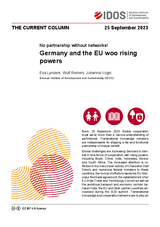No partnership without networks!
Germany and the EU woo rising powers
Lynders, Eva / Wulf Reiners / Johanna VogelThe Current Column (2023)
Bonn: German Institute of Development and Sustainability (IDOS), The Current Column of 25 September 2023
Bonn, 25 September 2023. Global cooperation must serve more than a narrow understanding of self-interest. Transnational knowledge networks are indispensable for shaping a fair and functional partnership of mutual benefit.
Global challenges are increasing Germany’s interest in new forms of cooperation with rising powers, including Brazil, China, India, Indonesia, Mexico and South Africa. The increased attention is reflected in the lively travel activity of Chancellor Olaf Scholz and numerous federal ministers to these countries, the revival of efforts towards the EU-Mercosur free trade agreement, the establishment of an EU-India Trade and Technology Council as well as the ambitious transport and economic corridor between India, the EU and other partner countries announced during the G20 summit. Transnational knowledge and cooperation networks are to play an important role in shaping relationships into comprehensive partnerships.
The growing interest in cooperation with this group of countries is in line with German and European efforts to reduce regional or sectoral dependencies through diversification and “de-risking”. Among other things, it serves to end energy dependence on Russia, a declared goal of the German National Security Strategy. Shifts in power in the international system make diverse, deeper partnerships even more relevant: China, a “partner, competitor and strategic rival” and the enlarged BRICS group are trying to bring about change to the “Western dominance” in the international order. Four successive G20 presidencies of rising powers put further issues of the “Global South” on the international agenda.
Germany’s and the EU’s effort to substantially deepen the cooperation with this group of countries comes rather late; but it is the right step – and should go beyond self-interest. The global challenges facing the world community require profound transformations, especially within the industrialised countries and the emerging economies. Without cooperation, the implementation of global agreements, first and foremost the Paris Climate Agreement and the 2030 Agenda, cannot be achieved. The framework conditions for real partnerships are difficult: Not all of the states mentioned share a liberal-democratic order, and their positions on fundamental sustainability issues are inconsistent. At the same time, the industrialised countries do not have a good record of fulfilled promises and cooperation on an equal footing.
Against this background, when it is a question of structuring global transformation processes – from climate protection to the reform of multilateral organisations – transnational networks of knowledge and cooperation can play an important part. In their exchange and cooperation structures, individuals and partner institutions can create common understandings of global challenges and approaches to solutions. Their dialogue can incorporate national perspectives and interests, and contribute to a joint definition of the common good at the same time. Under difficult political conditions, personal contacts based on trust are often the decisive level at which cooperation in partnership is initiated and implemented. Systemically, networks can share common knowledge between sectors (such as research and policy, but also civil society and the private sector) and feed into national policy and societal discourses.
When deepening the partnerships, actors in the global arena can build on transnational structures like the Managing Global Governance (MGG) network, as illustrated by numerous examples in its development over more than fifteen years: Network members take key positions in the G20 think tank process (Think20) and in the exchange on voluntary sustainability standards at UN level. They bring Agenda 2030 training for the public sector as an issue to the Mexican Senate and, as a reflection group, help to sharpen cooperation approaches and key terminology for strategic cooperation in the development of the BMZ position paper “Global Partners”. The joint development of knowledge and transformation competences, knowledge cooperation and policy dialogue formats also serve to develop a lasting cooperation infrastructure in which communication channels are maintained and expanded, and in which network members can support each other in shaping change processes.
It is in Germany’s and Europe’s enlightened self-interest not only to deepen cooperation with rising powers for the sake of “de-risking”, but also to strive for comprehensive partnerships for globally equitable sustainability transformations. In their development, long-term, well-maintained transnational knowledge and cooperation networks should be a central building block in order to create fair and functional partnerships of mutual benefit in which all actors can live up to their importance and responsibility.




